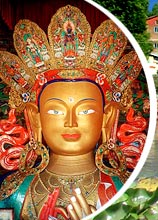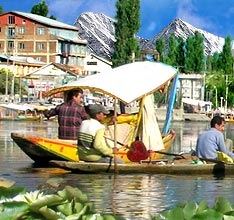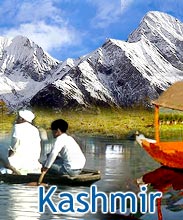 Founded
by Lama Lhawang Lotus, the Stok Gompa of Ladakh dates back to the 14th
century. It is a subsidiary of the Spituk Gompa and belongs to the
yellow-hat sect of Buddhism. The entrance verandah of the monastery is
adorned with colorful murals of the Guardians of the Four Directions.
The recently repainted Dukhang of the Stok Gompa houses a number of
banners and thankas. The left wall of the Dukhang has images of
Vajrapani (Vajra-in-Hand) and Avalokitesvara (Lord of All He Surveys) in
his four-armed manifestation.
Founded
by Lama Lhawang Lotus, the Stok Gompa of Ladakh dates back to the 14th
century. It is a subsidiary of the Spituk Gompa and belongs to the
yellow-hat sect of Buddhism. The entrance verandah of the monastery is
adorned with colorful murals of the Guardians of the Four Directions.
The recently repainted Dukhang of the Stok Gompa houses a number of
banners and thankas. The left wall of the Dukhang has images of
Vajrapani (Vajra-in-Hand) and Avalokitesvara (Lord of All He Surveys) in
his four-armed manifestation.The right wall stands proudly with the images of Sakyamuni (the Historical Buddha), his two disciples, Amchi (the Buddha Medicine), Tara (the Saviouress) and Nangyalma. There is a central throne inside the Stok Monastery of Leh Ladakh, which has been reserved for the Dalai Lama and the one on its right is for the head lama of Stok. Behind the Dukhang is a small chapel, constituting the oldest part of the Gompa. The central image inside the temple is that of Tsong-kha-pa, the founder of the yellow-hat sect of Tibetan Buddhism.
On the right-hand side of the Dukhang is another small chapel, housing a row of Buddha images that depict the eight hand gestures of Buddha. The Stok Monastery of Ladakh also has a library, with complete set of the Kandshur, the 108 volumes of the Buddha's teachings. Some time back, a new temple of Avalokitesvara was added to the monastery. It houses a large image of Avalokitesvara with his 1,000 arms and 11 heads. Nearby the Stok Gompa, a ritual dance-mask takes place on the 9th and 10th day of the Tibetan 1st month.









